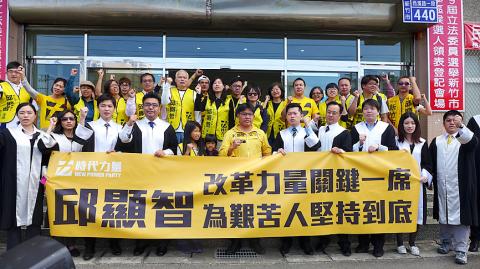New Power Party (NPP) legislative candidate Chiu Hsien-chih (邱顯智) yesterday registered his candidacy for the Hsinchu district seat, following the failure of efforts to “integrate” with Democratic Progressive Party (DPP) Legislator Ker Chien-ming (柯建銘).
“We showed a huge amount of good faith by putting out the possibility of integration polls, but that was not something we could make happen on our own,” Chiu said. “Prior to the official registration, there was always a possibility of using polls to integrate, but that possibility fell apart after [Ker] registered on Monday.”
“Integration” refers to an ad hoc primary process under which competing candidates agree to withdraw from the race and support whoever ranks highest in a negotiated set of surveys.

Photo: Wang Chun-chieh, Taipei Times
Ker last week was quoted in the Chinese-language media as saying that integration was a “fake issue” used for “electoral manipulation.”
“We will keep moving forward on our set course,” Chiu said, adding that while reform of the Legislative Yuan will remain one of the pillars of his campaign, his focus would be on the system, not Ker’s role as the DPP caucus whip.
Chiu has been critical of role that cross-party negotiations — often conducted behind closed doors — play in the passage of legislation, while Ker has said that such discussions are a necessary measure to solve deadlocks on the legislative floor.
Ker yesterday dismissed concerns that having two pan-green candidates in the race would deliver a victory to Chinese Nationalist Party (KMT) candidate Cheng Cheng-chien (鄭正鈐), citing last year’s Hsinchu mayoral election that saw DPP candidate Lin Chih-chien (林智堅) elected even though former DPP mayor Tsai Jen-chien (蔡仁堅) ran as an independent in the race.
Hsinchu is now the sole legislative district to have both a DPP and a NPP candidate in the Jan. 16 presidential and legislative elections, as the parties were able to coordinate on the nominations for most of the other district seats where there was an overlap.

Alain Robert, known as the "French Spider-Man," praised Alex Honnold as exceptionally well-prepared after the US climber completed a free solo ascent of Taipei 101 yesterday. Robert said Honnold's ascent of the 508m-tall skyscraper in just more than one-and-a-half hours without using safety ropes or equipment was a remarkable achievement. "This is my life," he said in an interview conducted in French, adding that he liked the feeling of being "on the edge of danger." The 63-year-old Frenchman climbed Taipei 101 using ropes in December 2004, taking about four hours to reach the top. On a one-to-10 scale of difficulty, Robert said Taipei 101

A preclearance service to facilitate entry for people traveling to select airports in Japan would be available from Thursday next week to Feb. 25 at Taiwan Taoyuan International Airport, Taoyuan International Airport Corp (TIAC) said on Tuesday. The service was first made available to Taiwanese travelers throughout the winter vacation of 2024 and during the Lunar New Year holiday. In addition to flights to the Japanese cities of Hakodate, Asahikawa, Akita, Sendai, Niigata, Okayama, Takamatsu, Kumamoto and Kagoshima, the service would be available to travelers to Kobe and Oita. The service can be accessed by passengers of 15 flight routes operated by

Taiwanese and US defense groups are collaborating to introduce deployable, semi-autonomous manufacturing systems for drones and components in a boost to the nation’s supply chain resilience. Taiwan’s G-Tech Optroelectronics Corp subsidiary GTOC and the US’ Aerkomm Inc on Friday announced an agreement with fellow US-based Firestorm Lab to adopt the latter’s xCell, a technology featuring 3D printers fitted in 6.1m container units. The systems enable aerial platforms and parts to be produced in high volumes from dispersed nodes capable of rapid redeployment, to minimize the risk of enemy strikes and to meet field requirements, they said. Firestorm chief technology officer Ian Muceus said

MORE FALL: An investigation into one of Xi’s key cronies, part of a broader ‘anti-corruption’ drive, indicates that he might have a deep distrust in the military, an expert said China’s latest military purge underscores systemic risks in its shift from collective leadership to sole rule under Chinese President Xi Jinping (習近平), and could disrupt its chain of command and military capabilities, a national security official said yesterday. If decisionmaking within the Chinese Communist Party has become “irrational” under one-man rule, the Taiwan Strait and the regional situation must be approached with extreme caution, given unforeseen risks, they added. The anonymous official made the remarks as China’s Central Military Commission Vice Chairman Zhang Youxia (張又俠) and Joint Staff Department Chief of Staff Liu Zhenli (劉振立) were reportedly being investigated for suspected “serious